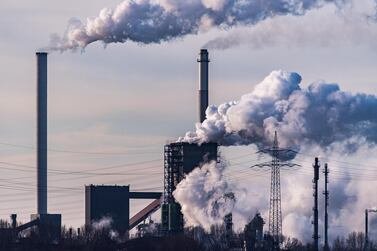A new UN youth ambassador from Istanbul has condemned Turkey for not implementing the Paris Climate Agreement as the only G20 country not to even ratify the deal.
Ilayda Eskitascioglu, a human rights lawyer, told a conference on Sustainable Development Goals that her country, like several others, was not taking the 2016 climate accords seriously enough.
During an online seminar hosted by the India actress and SDG advocate Dia Mirza, she was asked if international law was ready to deal with the impact of climate change.
“There are major problems with international laws too slow to react to climate change, including the adoption and enforcement of international documents," Ms Eskitascioglu said.
"The Paris Climate Agreement is a very important document in these terms but there are still states to this day that haven't signed or adopted the agreements, including my country, Turkey, unfortunately.”
She said some states that signed the agreement had shown only “minimal commitment, which doesn't mean they take proper action”.
Ms Eskitascioglu, 26, said some countries regarded climate change “as a policy issue” and while there were "national action plans" they had very few legally binding frameworks.
But there had been successes around the world achieved by “strategic litigation” and determined climate activists.
“The Dutch government was held accountable and its citizens established that their governments had a legal duty to prevent dangerous climate change and to urgently and significantly reduce emissions,” Ms Eskitascioglu said.
But this type of action was rare and legislation on climate change was “far, far behind”.
The UN conference also heard from Mariama Badji from Senegal, another youth envoy, who called for greater equality on climate policy.
“The richest 1 per cent of the world's population gives double the emissions of 50 per cent of the poorest people, yet the poorest people are the most affected," Ms Badji said.
"Climate justice means that everyone should be responsible for their emissions.”
This led to the conclusion that those least responsible for climate change suffered its “grievous consequences”.
“To me, climate justice means the fair treatment of all people and the freedom from discrimination in the creation of policies that address the climate change,” said Ms Badji, a civil engineer who runs her own environmentally responsible building company.
"And I strongly believe that by working together, we can create a better future for the present and next generation.
Ms Eskitascioglu said young people must keep pressuring governments for change.
“We have created this wonderful momentum," she said. "It's time to build on this but based on our voice being prouder and louder, to save the planet.”
Ms Badji said young people were in for a struggle to produce change.
“It's a fight for every human being and the well-being of the planet," she said.
"We must preserve our resources, save the planet and most importantly we must join our forces, because it's all of us fighting for the next generation. The time to act is now.”







